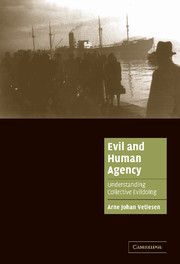Book contents
- Frontmatter
- Contents
- Preface
- A note on the cover image
- Introduction
- 1 The ordinariness of modern evildoers: a critique of Zygmunt Bauman's Modernity and the Holocaust
- 2 Hannah Arendt on conscience and the ‘banality’ of evil
- 3 The psycho-logic of wanting to hurt others: An assessment of C. Fred Alford's work on evil
- 4 The logic and practice of collective evil: ‘ethnic cleansing’ in Bosnia
- 5 Responses to collective evil
- 6 A political postscript: globalization and the discontents of the self
- References
- Index
- Evil and human agency
3 - The psycho-logic of wanting to hurt others: An assessment of C. Fred Alford's work on evil
Published online by Cambridge University Press: 10 December 2009
- Frontmatter
- Contents
- Preface
- A note on the cover image
- Introduction
- 1 The ordinariness of modern evildoers: a critique of Zygmunt Bauman's Modernity and the Holocaust
- 2 Hannah Arendt on conscience and the ‘banality’ of evil
- 3 The psycho-logic of wanting to hurt others: An assessment of C. Fred Alford's work on evil
- 4 The logic and practice of collective evil: ‘ethnic cleansing’ in Bosnia
- 5 Responses to collective evil
- 6 A political postscript: globalization and the discontents of the self
- References
- Index
- Evil and human agency
Summary
Introduction
I now turn to a theoretical approach to evil quite different from those considered so far. In several books, the American philosopher C. Fred Alford engages with the phenomenon of evil. Alford's contribution makes for a fresh start: by focusing on evildoing as performed in a face-to-face, more or less ‘private’ context, Alford directs attention at the social micro-level on which evil takes place most of the time, being a personal and emotionally charged affair. This micro-oriented approach sharply contrasts with the macro-sociological analysis of organized evil given by Bauman; it also differs from Arendt's philosophical reflections, centring on the Holocaust and on Eichmann. Alford's point of departure is not informed by such conspicuous embodiments of evil. Instead, his focus is on evil in its existential dimension, as a theme confronted and (somehow) tackled in every human individual's life. Sociologically, this makes for a bottom-up approach, in Alford's case thoroughly informed by psychoanalytic theory, in particular concepts and insights developed by Melanie Klein. I shall argue that this type of approach partly puts into question and partly supplements those of Bauman and Arendt. My distinction between individual and collective evil will be theorized in a novel manner. Though interesting in its own right, Alford's largely Klein-inspired take on the relationship between individual and group will be of special usefulness when we turn to the evildoing characteristic of so-called ‘ethnic cleansing’ in the next two chapters.
- Type
- Chapter
- Information
- Evil and Human AgencyUnderstanding Collective Evildoing, pp. 104 - 144Publisher: Cambridge University PressPrint publication year: 2005

